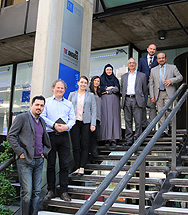An international workshop in London analyzed the challenges of educating Muslim children in Europe
The workshop was organized by Daniel Moulin, a researcher for the Religion and Civil Society project at ICS, and Farid Panjwani, the director of the Center for Research and Evaluation on Muslim Education at University College London

Experts from academic centers in the U.K., the U.S. and Spain analyzed the challenges of educating Muslims in Europe at an international workshop held in London. It took place at the Institute of Education of University College London, which is ranked first in the QS World University Ranking of Education.
The workshop was organized by Daniel Moulin, a researcher for the Religion and Civil Society project at ICS, and Farid Panjwani, the director of the Center for Research and Evaluation on Muslim Education at University College London. It took place in London with funding from The Spalding Trust.
Speakers included Kirsten Yoder Wesselhoeft, a professor of religion at Vassar College in New York, Shiraz Thobani from the Institute of Ismaili Studies in London, Reza Gholami, a professor of the sociology of education within the School of Social and Political Science and Public Policy at Keele University (U.K.), and Robert Bowie, president of the Association of University Lecturers in Religion and Education and a senior lecturer in the School of Childhood and Education Sciences at Canterbury Christ Church University (U.K.).
Special Issue in the Oxford Review of EducationThe workshops’ papers will be published in a special issue of the Oxford Review of Education, a prestigious international journal on education. Moulin and Panjwani will serve as the issue’s guest editors.
This workshop critically looked at ongoing controversies surrounding the education of Muslims in Europe. A central theme of this discussion was that of ‘religiofication’ – the increased identification of Muslim populations in western contexts by religious identity rather than through varied lenses of ethnic or national attachments as they had been previously. The workshop explored several questions around this theme related to schooling: Has this shift been helpful or detrimental in terms of nurturing citizenship? What new possibilities has it opened and what possibilities has it closed? How do we ensure that people from Muslim heritage are portrayed in their complexity, diversity and historicity? The speakers focused on aspects such as policies, public discourse, text in books, students’ perspectives in order to analyze their impact and chart a more complex and socially grounded path toward educational praxis and commitment to people of Muslim heritage.
